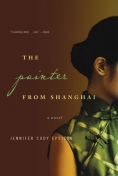BKMT READING GUIDES
The Painter from Shanghai: A Novel
by Jennifer Cody Epstein
Paperback : 432 pages
2 clubs reading this now
0 members have read this book
Down the muddy waters of the Yangtze River, through the raucous glamour of prewar Shanghai and the bohemian splendor of 1920s Paris, and back to a China teetering on the ...
Introduction
"A historical novel on a grand scale . . . a dark love story, a triumphant tale of survival."--Maureen Howard
Down the muddy waters of the Yangtze River, through the raucous glamour of prewar Shanghai and the bohemian splendor of 1920s Paris, and back to a China teetering on the brink of revolution: this is the epic story of Pan Yuliang, one of the most talented--and provocative--Chinese artists of the twentieth century.
Discussion Questions
1. Pan Yuliang’s history, combined with the overt sensuality of her paintings, presents something of a catch-22; on the one hand her past as a prostitute and concubine added immeasurably to her fame (and infamy). But on the other hand, it proved an impossible label to escape; in many people’s eyes she is still “the prostitute-turned-painter.” Does her past at all color the way you think about her work—and if so, in what way? And is this a good thing, or not? And lastly—do you think a male artist would have had to fight his past in the same way?2. Pan Yuliang’s legacy in China remains controversial to this day—in the 90’s, nude portraits were removed from a Beijing exhibition—something that would almost certainly not have happened to a male artist. Do you think similar prejudices affect the way Western viewers view art by female artists here? Can you think of art that “shocks” you as her work once did a conservative Chinese audience—and does that “shock” factor add, or detract to the value of the painting for you?
3. Liu Haisu—one of China’s founding modern artists—once called Pan a “warrior for beauty.” Her romantic, post-impressionistic style—daring as it seemed in the early 20’s—was quicky labeled decadent and old-fashioned by the new regime once the Communists came to power. Is there any truth, do you think, in the Socialist idea that art should strictly be used to defend justice and expose oppression? In what ways has art, in some form, played a formative role in your own political or philosophical life (think of paintings that make you think; of photographs that have struck you or taught you; of plays or books that changed your opinion of something)?
4. One of the most interesting responses I’ve had to my book so far was on a site—interestingly enough—dedicated to black romance readers: my automatic google search on “Painter” turned up a thoughtful and somewhat lively debate, sparked by my name (“which sounds pretty anglo”) and the subject of my book, on whether the assumption of a voice of a character of a different race is automatically an appropriation and therefore inappropriate.
I’ll confess that this was actually one of my main concerns when I sat down, finally, to write Painter. I was heartened to remember that scores of my favorite authors—William Shakespeare (“Othello”), Shusaku Endo (“Silence”), Gustave Flaubert (“Madame Bovary”), Leo Tolstoy (“Anna Karenina”), Dave Eggars (“What is the What”) and of course Pearl S. Buck (“The Good Earth” and about a million other books, most of them written from the perspective of strong Asian women) have assumed voices of people utterly not themselves—racially, culturally, genderly, or otherwise. And yet my ambivalence about both my own talents and my right to this particular subject led me to hold off for well over a year before I finally began writing; it was my biggest fear that I’d be seen as exploitative rather than empathetic in the choice of my subject.
So (finally) here’s my question: Do you think writers should write “what they know?” And how does your knowledge of a writers race and gender affect your reading of their voice? What do you think makes the assumption of a voice that is “other” exploitative, as opposed to merely explorational? And what books have struck you as the most effective or “authentic” among those written by authors not of the same race and/or gender as their protagonists?
Notes From the Author to the Bookclub
A rich re-imagining of the life of pioneering Chinese post-Impressionist Pan Yuliang. What made you want to write this book? What was the idea that sparked your imagination? My first encounter with one of Pan’s paintings. Set against other modern Chinese works in a Guggenheim exhibit—ink-and-brush, poem pictures, huge propaganda-ish posters—it stood out to me, with its rich, Cezannesque tones and delicate Chinese strokes. Pan’s own depiction of herself—austere, sad, stern—fascinated me. And the accompanying bio outlining her extraordinary life absolutely blew me away. What do you want readers to take away with them after reading the book? The limitless possibilities for change, reinvention and creation that life presents to each one of us. The innumerable possibilities offered by the mergings of vastly different—even clashing-- art forms, cultures, lives,. And the uncountable lessons offered to us in lives lived by others—regardless of race, gender and culture.Book Club Recommendations
Recommended to book clubs by 0 of 0 members.
Book Club HQ to over 90,000+ book clubs and ready to welcome yours.
Get free weekly updates on top club picks, book giveaways, author events and more








